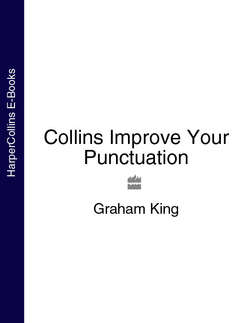Читать книгу Collins Improve Your Punctuation - Graham King - Страница 14
The Common, but Contrary, Comma.
ОглавлениеThe comma is the most flexible, most versatile of all the punctuation marks. Because it is the least emphatic mark it is also the most subtle and complex. And contrary. Not surprisingly, many writers feel a nagging uncertainty about using commas.
While the full stop brings proceedings to a screeching halt, the comma, with its mortar-like ability to build complex sentences, enlarges upon thoughts, joins them to further thoughts and afterthoughts, binds in extra information, and generally has a good time. A writer with full command of the comma can have a ball. Here’s the English humourist and columnist Alan Coren displaying an enviable skill in a passage in which the commas are like the carefully placed hoofprints of a horse lining up for a jump, and then – a long soaring comma-less passage follows before the full stop landing!
Until I was 40, I was utterly urban, uneasy in any surroundings more arborious than a sparsely tubbed patio, and knowing no more of wildlife than that a starling was probably taller than a stoat. As for the horse, I regarded it primarily as something to watch out for in French casseroles. But 40 is a critical age, a time for last-ditch stands, so I bought that last ditch in the New Forest, and the hovel that leaned over it, and enough land for the kids to run about and get tetanus in, somewhere, in short, which would allow me to escape into that sweet Arcadia where deer eat the rockery and mice eat the roof and ponies eat the hedges and a man can be snug in his nocturnal cot and hear naught but the soporific sound of death-watch beetles laughing at the inadequacy of creosote.
Now that, to a comma freak, is about as good as you’ll find anywhere in the language. Note, too, that Coren even gets away with a comma (after get tetanus in, … ) where ordinary grammatically correct mortals would have placed a semicolon.
But back to earth. Perhaps the most resilient myth about commas is that they indicate natural breath pauses. There was a lot of truth in this, as we have seen, when the language was more orally inclined, but today commas have all but succumbed to grammatical logic.
Every year over the British Isles, half a million meteorites enter the atmosphere.
You can hear the speaker intoning this, can’t you – with a dramatic pause before announcing the impressive statistic half a million. Try it. But when you write it down as a sentence you find that the comma is redundant:
Every year over the British Isles half a million meteorites enter the atmosphere.
Most writing today demands that commas be logical, but if you are a novelist, reporting a character’s speech, you would be correct to use what are called ‘rhetorical commas’ when the character takes a breath.
Contemporary writing is far less rambling and rhetorical than it was in Dickens’ day. Here’s a not untypical sentence from Martin Chuzzlewit:
Then there was George Chuzzlewit, a gay bachelor cousin, who claimed to be young, but had been younger, and was inclined to corpulency, and rather overfed himself – to the extent, indeed, that his eyes were strained in their sockets, as if with constant surprise; and he had such an obvious disposition to pimples, that the bright spots on his cravat, the rich pattern on his waistcoat, and even his glittering trinkets, seemed to have broken out on him, and not to have come into existence comfortably.
Tot up the commas – twelve in all, plus a dash and a semicolon. If you were disposed to attempt such a sentence today you would probably use only five commas, six at most. Whether it would retain the magic, though, is another matter. Try it.
